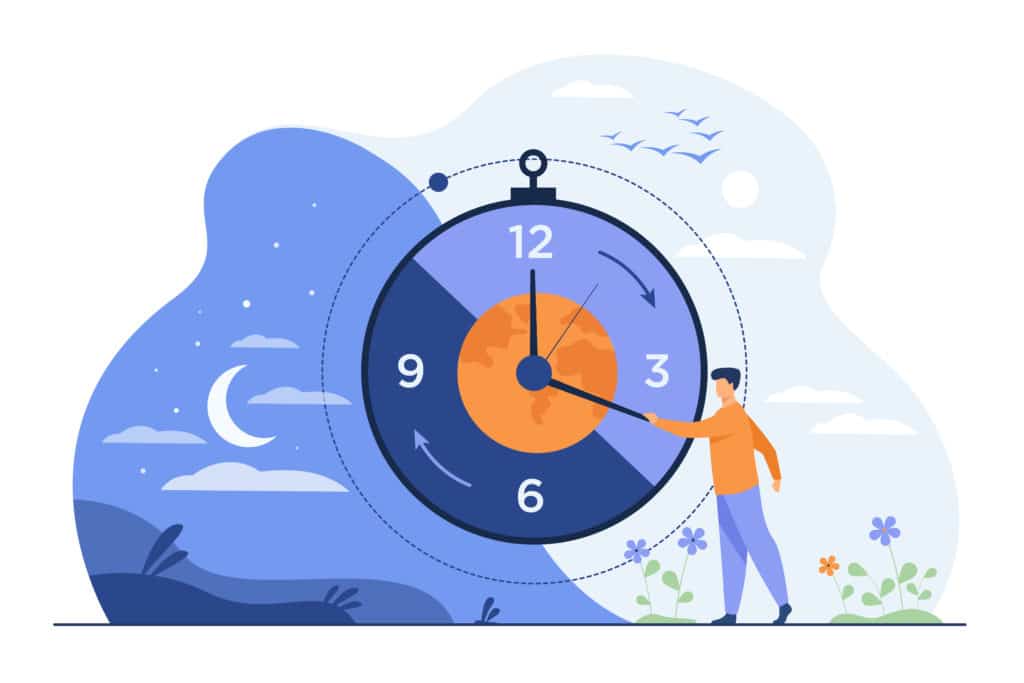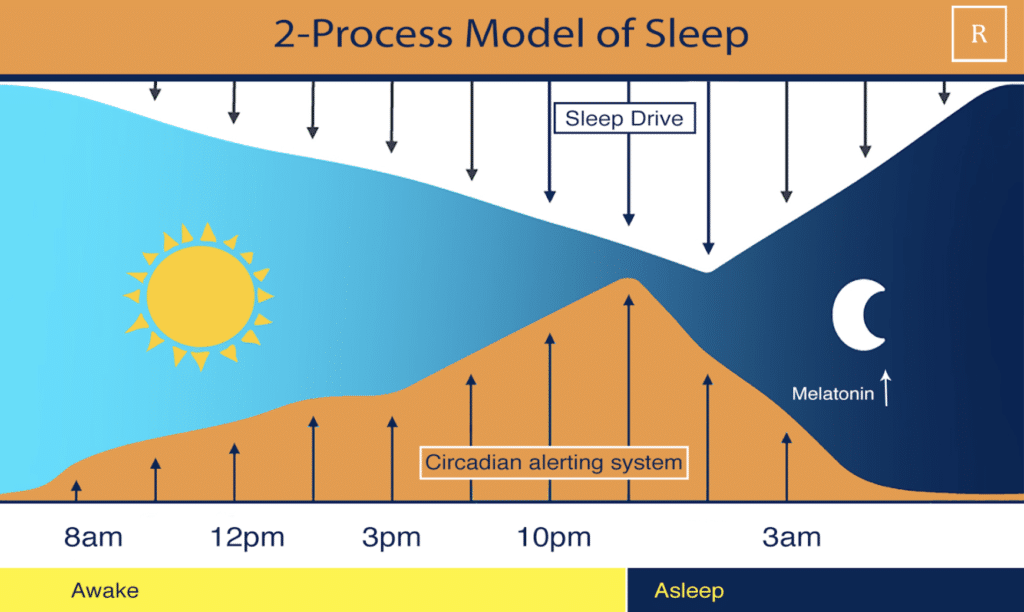
THE BOTTOM LINE:
Your circadian rhythm regulates your sleep-wake cycle
It is sensitive to cues in your environment such as light
Disruptions to it can cause circadian rhythm disorders
It's just a biological clock!
Similar to how you organize your daily schedule with the time (i.e. a clock), your brain organizes your various bodily schedules with a “biological clock”. Your biological clock has 24-hour cycle circadian rhythms running in the background which regulate processes like hormone production, body temperature, metabolism, and your sleep-wake cycle. You may have guessed this already, but your sleep-wake cycle is pretty important.
Rewind! Before we dive deeper into what your circadian rhythm does, let’s talk about what it is.
What exactly is circadian rhythm?
The word circadian literally means “about a day”, which makes sense because your circadian rhythm runs roughly on 24-hour cycles. The timing of your circadian rhythm is controlled by a group of cells in your brain called the suprachiasmatic nucleus (say it now– soo-pruh-kee-uhz-ma-tuhk noo-klee-uhs). Ok, fine, we’ll just call it the SCN. You may also see the SCN referred to as the master clock. Your SCN is the coordinator of rhythms and it sits in an area of your brain that’s directly behind your eyes.
How does my circadian rhythm work?
Although your circadian rhythm can do some things independently, it’s never that fun to work alone. Your SCN uses cues from your environment to regulate your sleep-wake cycle. The reason it is sensitive to cues is so that your body can adjust to changes in your environment. Unfortunately, signals like artificial light can disrupt normal rhythms, leading your body to send signals at the wrong time.
What environmental cues affect my circadian rhythm?
Environmental cues that affect your circadian rhythm are referred to as zeitgebers. The key zeitgebers that impact sleep are light, temperature, eating, activity, and stress.
1. Light
Light intake is the most important environmental influence for adjusting your sleep-wake cycle. Cells in your eyes (specifically, your retina) measure the amount of light and then send signals to your SCN to stop melatonin production and boost wakefulness. Similarly, darkness results in the opposite effect, where signals to halt melatonin stop, allowing secretion of melatonin.
2. Temperature
Your body temperature fluctuates throughout the day to sync with your sleep-wake cycle. For example, it rises toward the morning as your body produces wakefulness-boosting cortisol. Your body temperature begins dropping toward the night as your body releases melatonin for sleep. Sleeping in a cool room at night can help induce better sleep by increasing melatonin production.
3. Timing of eating
Eating is an important cue for your circadian rhythm and eating at unusual times can be disruptive to your circadian rhythm. The relationship between the timing of meals and your circadian rhythm is primarily controlled by insulin. Your metabolism shifts throughout the day and most people benefit by eating larger meals earlier in the day. Skipping breakfast, eating large meals late at night, and fasting can all be disruptive to your circadian rhythm. However, everyone is unique. The most important factor is to remain fairly consistent in your meal times so that your natural rhythms aren’t disrupted.
4. Timing of activity
Physical activity is a strong entrainment factor for your circadian rhythm (entrainment factors modify your circadian rhythm). The time of day you exercise can have a direct impact on your circadian rhythm. Exercise can even be used to adjust your circadian rhythm forwards or backward. For most people, aerobic exercise close to bed can be disruptive to sleep but weight training and yoga can be conducive to sleep. However, for people who fall asleep too early, physical activity in the evening can help them push their circadian rhythm later.
5. Stress
It’s probably not a surprise that stress can wreak havoc on your circadian rhythm. Prolonged stress activates pathways in your brain and body that lead to hyperarousal and impair your body’s natural rhythms, often leading to poorer sleep quality. Reducing stress is therefore vital when trying to maintain a healthy circadian rhythm.
How does my circadian rhythm control sleep?
In ideal conditions, your circadian rhythm sends signals at the right times to trigger sleepiness and wakefulness. The two main hormones involved in this process are cortisol and melatonin.
Making Melatonin: When exposed to darkness, your brain cells send signals to an area of your brain called the pineal gland to produce and release melatonin. Melatonin is a hormone that makes you sleepy and it is mostly nonexistent during the day and peaks during the night.
Circling Cortisol: Cortisol is a wakefulness-promoting hormone that rises in the morning and drops in the evening. Your cortisol levels fluctuate on a 24-hour cycle and are affected by various processes in your body and environment.
Melatonin and cortisol should always have a see-saw effect in your body– when melatonin is high, cortisol should be low. When this pattern is disrupted it can negatively impact your sleep.
Why do I feel tired at the end of the day?
When your natural rhythms are aligned you generally feel tired around the same time every night. In order for this effect to work well, your circadian rhythm needs to also be synced up with your sleep drive.
Sleep Drive: During the day a chemical in your brain called adenosine slowly builds up in your brain, which ultimately leads you to feel sleepy. As adenosine builds, it leads to sleep pressure after around 16 hours of being awake. Ideally, this sleep pressure syncs up with nightly lulls from your circadian rhythm and you go to snooze town. Sleep clears your adenosine levels and the process starts all over again the next day.

Circadian rhythm disorders
Various factors can make your circadian rhythm go out of sync. Some common causes are aging, travel, shift work, and using digital devices too late at night. An out-of-sync circadian rhythm can lead to a number of different disorders.
Advanced sleep-phase disorder
The early bird catches the worm? Not likely with this sleep disorder. It causes you to fall asleep early in the evening and wakes you up in the middle of the night (2-5am). This can cause you to feel groggy and unpleasant during the day. Advanced sleep-phase disorder typically occurs in older adults and people can either adjust their lives around their schedule or use techniques to realign their sleep-wake cycles.
Delayed sleep-phase disorder
Being a night owl is not always a party! Delayed sleep-phase disorder is when your sleep is delayed by two hours or more beyond what is considered your normal bedtime. This disorder keeps you awake until the early hours of the morning and then causes you to sleep into the afternoon. The disorder is possibly genetic and experts believe many people with this disorder have a circadian rhythm that is longer than 24 hours. There is no known cure but symptoms can be managed with environmental cues like light and routine.
Irregular sleep-wake rhythm disorder
This disorder keeps you from having any consistency to your sleep pattern. Instead of a full night’s sleep each night, you may instead have many naps throughout a 24-hour period. This happens when the functioning of your master clock is limited by damage to the brain, which could be caused by a neurodegenerative disease (such as dementia) or a brain injury.
Non-24 hour sleep-wake disorder
Anyone who is not able to receive light-based environmental cues (such as people who are blind) would see their sleeping hours constantly shifting. Non-24 sleep-wake disorder occurs in 55-70% of completely blind people and some sighted people. With the disorder, your body would still follow daily circadian cycles but your sleep schedule would change by minutes or hours at a time. People with this disorder have a natural circadian rhythm that ranges from 24.1 to 30 hours.
Jet lag disorder
Jet lag is a temporary sleep disorder that occurs when your body is synced to a different time zone than your current environment. This can cause insomnia and reduce your sleep quality. Jet lag disorder usually improves on its own after several days. Learn ways to prevent jet lag or mitigate the impact.
Shift work disorder
Shift-work often consists of working through the night and sleeping during the day. This can make it tricky to sync your sleep-wake cycle with the daily light-dark cycle and can cause major disruptions to your circadian rhythm. Learn ways to cope with circadian rhythm disturbances caused by shift work.
What else impact my circadian rhythm?
Environmental cues aren’t the only factors that can impact your circadian rhythm. Another big influence on your natural rhythm is your age! Babies, teenagers, and adults have different circadian rhythm experiences.
Infants: Fun fact! Newborns do not have a circadian rhythm. An infant’s circadian rhythm develops once they begin to release melatonin (3 months) and cortisol (2-9 months). This makes for very unpredictable sleep schedules for babies.
Children: As the circadian rhythm matures, the sleep schedule for toddlers and children becomes regulated.
Teenagers: A circadian rhythm shift occurs in teenagers that phase-delays their sleep schedule, causing them to go to sleep later at night and wake up later in the morning.
Adults: Into adulthood, your circadian rhythm should reach a stable and consistent schedule. Older adults often start to notice a phase-advanced shift in their circadian rhythms, causing them to become tired much earlier in the night and wake up earlier in the morning.
How do I adjust my circadian rhythm?
If your circadian rhythm is out of whack, you can use various techniques such as timed light exposure and exercise to readjust it. In general, you can only adjust it by about one hour per day. As a general rule, your circadian rhythm likes consistent routines and activities in order to function optimally.
How do I keep a healthy circadian rhythm?
The most important cues are light, so getting ample sunlight (or light exposure through a happy lamp) in the morning and minimizing light exposure in the evenings before bed are the most powerful techniques for keeping a healthy circadian rhythm. Getting around 20 minutes of natural sunlight in the morning is generally the number one recommendation for improving your body’s natural rhythm.
You can also improve your internal clock by keeping a consistent schedule. Eating, sleeping, and exercising close to the same time every day are great techniques to keep things regulated. Maintaining bedtime and morning routines also act as important regulating cues for your sleep-wake cycle.






